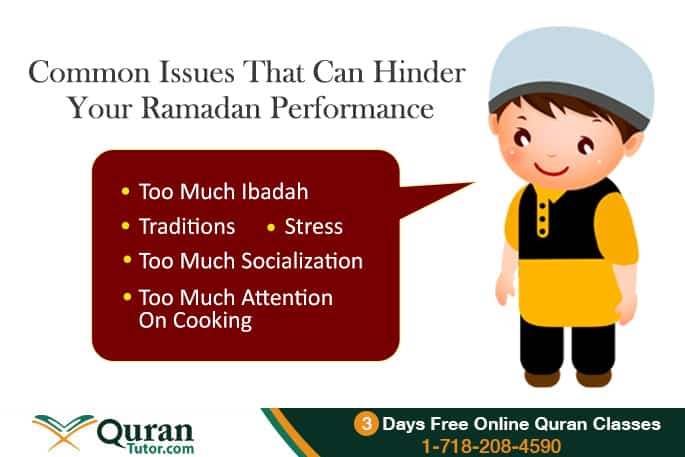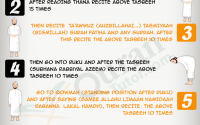Common Issues That Can Hinder Your Ramadan Performance
In order to honor Ramadan in the best manner, Muslims make special preparations to ensure that the sacred month is observed in a manner that is most worthy of the blessings it comes with. Therefore, before the start of Ramadan Muslims start making preparations in order to ensure that there is a minimal problem during the month and every day is enjoyed and observed in a joyful manner.

When there is lack of preparation, for some people it becomes hard to transit to the routine of Ramadan and for them their earlier routine and habits start hindering in their performance in terms of prayers and observing healthy fast. The lines below discuss the common issues that can hinder in your Ramadan performance, so that you can avoid them and enjoy a better Ramadan.
Too Much Ibadah:
Each and every moment of Ramadan is sacred and in order to get the most out of these moments, Muslims indulge in too much prayer and do all sorts of Ibadah to increase the reward. However, the mistake which Muslims make in this regard that makes Ramadan difficult for them is too much prayer. Those Muslims, who pray too much in Ramadan, they leave all their other responsibilities, which as a matter of fact makes it difficult for them and their family members to continue on with regular routine. Hence, when routine is disturbed, the ultimate result is fasting in Ramadan becoming difficult and hindering in performing every day responsibilities. Therefore, moderation is the key and a Muslim no doubt should go for increased Ibadah but after proper planning. For that, you can check for daily prayers to offer in Ramadan.
Remember, Islam does not allow too much praying that would upset your health and become a major reason of you not getting hold on your major responsibilities.
Traditions:
The traditions range from family traditions to social traditions. People living in the form of family and in a particular social setting develop a specific set of traditions pertaining to how Ramadan is to be observed and celebrated. These traditions may govern the way Muslims start with Suhoor and do Iftaar or they can affect the way additional prayers and Ibadah is undertaken by a Muslim. In this regard, a Muslim needs to segregate the traditions and identify the ones that help in making Ramadan better and those who hinder in performing the Ramadan duties. A Muslim must always remember that Islamic duties are important and superior than traditions, hence the favorable ones should be accepted while the ones that do not resonate with the spirit of Ramadan should be avoided and refrained from straight away.
Too Much Attention On Cooking:
Suhoor and Iftar are two integral components of the daily fasting routine. Muslims make special preparations for both the meals as one mark the closing of fast while the other marks the breaking of fast. Although these should be considered only as meals, however, Muslim in general and Muslim women in particular tend to spend too much time in cooking preparations for these two meals to bring taste on the Iftari table. The women are supposed to offer prayers and perform Taraweeh after Iftar, however, they are so much consumed in cooking that they find very little time to offer Taraweeh with the religious zest and prayer. Similarly, before Suhoor when women should be finding time to recite Quran, it is the cooking preparations that take up most of their time and they find it difficult to spend time in prayers and deeds that offer greater reward. Hence, in order to avoid such situations, it is imperative that Muslim women and men try keeping the meals as simple as possible and not indulge in extravagant arrangements for the meals so that they have more time for doing what Ramadan is actually for, that is praying and worshiping Allah Almighty.
Stress:
Ramadan teaches us patience and tolerance, however, because of the everyday life, people tend to always remain under pressure during Ramadan and under this pressure they stress out and cause trouble for themselves and for others in Ramadan. This stress and depression basically takes place when there is lack of management pertaining to finishing respective tasks in a proper manner and putting the body through too much pressure. To avoid such problems that lead to stress, it is imperative that you have your routine properly planned for the day and try bringing down the intensity with which you do things so that you don’t put too much pressure on your body and it reserves energy and stays calm and serene throughout the fast and the whole month of Ramadan. To relieve yourself from the stress, you are advised to consult with Muslims guide for dealing with stress and depression.
Too Much Socialization:
Although socialization is important but when socialization occurs at the cost of losing important time or causing problem for normal routine, then such socialization is not preferred. Similarly, in Ramadan, people tend socialize too much actually mar the essence of Ramadan. There is no problem in inviting guests to Iftaar and breaking the fast with them, however, if the company of them keeps you from offering Salah with congregation or the Taraweeh prayer afterwards, then you need to reconsider your socialization, as it contradicts with Ramadan has to offer. Moreover, moderate socialization is perhaps one of the perks of Ramadan as in Ramadan you get to meet people during the Taraweeh prayer, the Iftar dinners allow you to meet people and above all the auspicious occasion of Eid give you a chance to meet people whom you have not met in a long while. Therefore, socialization in moderation comes with Ramadan, but the excess of it hinders with Ramadan objectives.
Conclusion:
In a nutshell, it is imperative that a Muslim avoids all such activities and deeds that do not let him or her enjoy Ramadan in the true sense. Ramadan like Islam is to be observed in moderation and one should create a balance between prayer and regular routine to make sure that Ramadan is observed in the true spirit.









